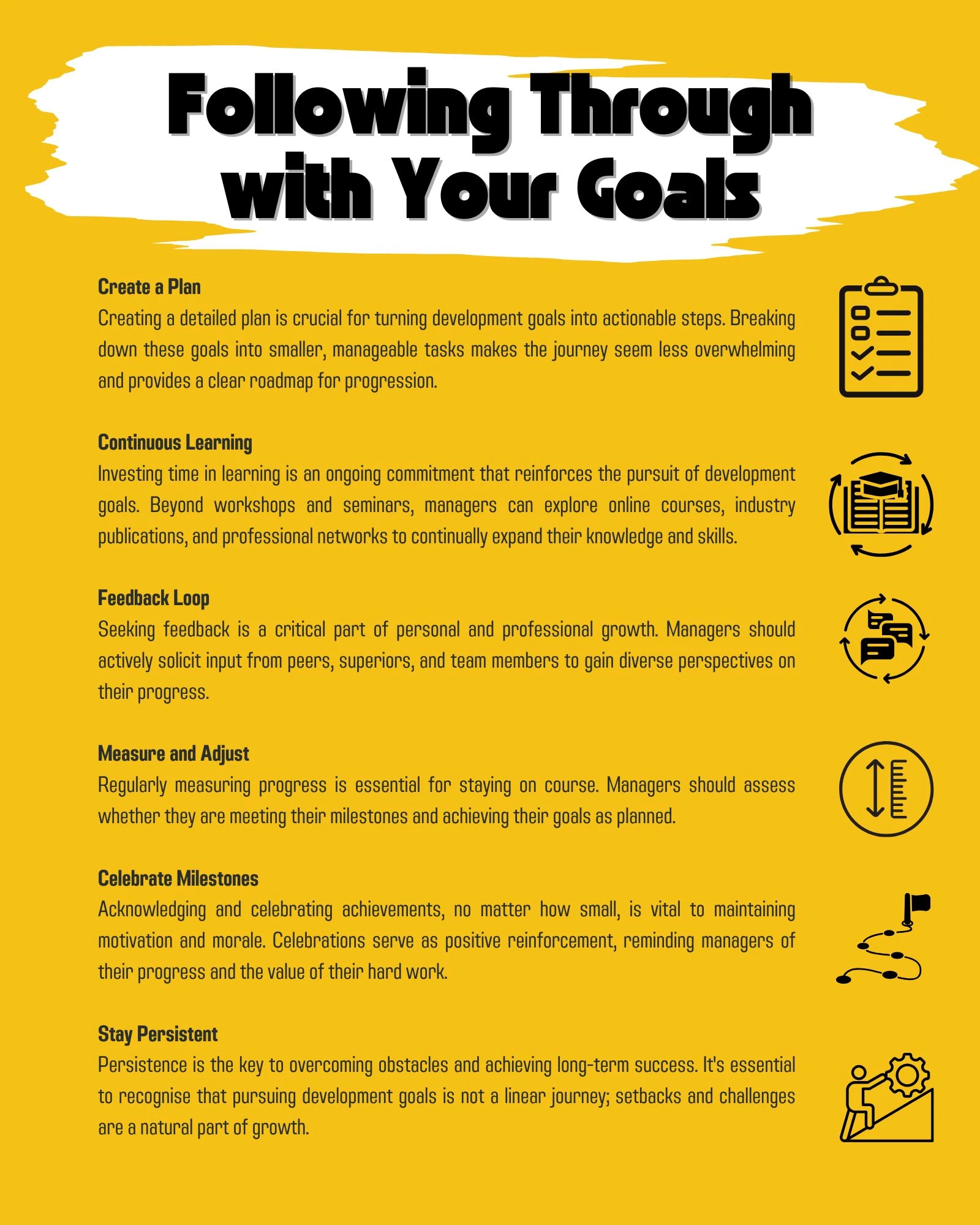- Table of Contents
- Understanding Development Goals for Managers
- The Importance of Setting Development Goals
- Direction and Focus
- Motivation and Engagement
- Continuous Learning
- Leadership Example
- Performance Enhancement
- Top 8 Development Goals for Managers
- 1- Enhancing Leadership Skills
- 2- Mastering Strategic Thinking
- 3- Effective Communication
- 4- Adapting to Change
- 5- Emotional Intelligence (EI)
- 6- Time Management and Prioritisation
- 7- Mentorship and Coaching
- 8- Business Acumen
- Following Through with Your Goals
- Create a Plan
- Continuous Learning
- Feedback Loop
- Measure and Adjust
- Celebrate Milestones
- Stay Persistent
- The Power of Networking for Managers
- Building Valuable Relationships
- Leveraging Collective Knowledge
- Staying Informed and Adapting
- Collaboration and Partnerships
- Career Growth and Mentorship
- Nurturing a Positive Reputation
- Staying Agile and Adaptable
- Fostering Trust and Credibility
- In Conclusion
Introduction
Embarking on a journey of professional growth is a hallmark of a true leader. As a manager, pursuing excellence is a personal endeavour and a responsibility to your team and organisation. A well-structured General Manager Development Plan can be your compass on this voyage, guiding you through uncharted waters while helping you hone your skills, enrich your knowledge, and amplify your impact. In this comprehensive guide, we will explore the intricacies of a General Manager Development Plan, understanding its goals, significance, and the top eight development objectives it encompasses. So, let's delve into the world of purposeful development and chart a course for managerial success.
Understanding Development Goals for Managers
At the heart of every successful manager lies a fervent desire to improve for personal advancement and to lead their team towards greatness. Development goals for managers are the strategic objectives that outline the skills, knowledge, and competencies they aim to enhance during their career journey. These goals encompass a broad spectrum of qualities, from communication and leadership prowess to strategic thinking and emotional intelligence. Essentially, these objectives serve as a roadmap, helping managers navigate their career trajectories with purpose and precision.
The Importance of Setting Development Goals
Setting development goals is akin to plotting coordinates before embarking on a voyage. Without them, managers risk sailing without direction, potentially leading to stagnation and disengagement. Here's why setting development goals is of paramount importance:
Direction and Focus
Development goals serve as a North Star, providing managers with a clear path to follow in their professional journey. Managers may be adrift in a sea of responsibilities and tasks without these guiding objectives. They can confidently steer their efforts toward meaningful growth and progress with defined goals. This clarity of direction benefits the manager and aligns the entire team with a shared purpose, fostering a sense of unity and a common vision.
Motivation and Engagement
Well-defined development goals have a remarkable power to ignite motivation and sustain engagement. When managers have a purposeful target to strive for, their work takes on new meaning and significance. This sense of purpose propels them to push their boundaries, seek out opportunities for improvement, and consistently deliver their best performance. Moreover, motivated managers are more likely to inspire and energise their teams, creating a positive work environment where everyone is driven to excel.
Continuous Learning
Goals act as catalysts for continuous learning and skill acquisition. They fuel a hunger for knowledge that drives managers to seek out educational opportunities, attend workshops, pursue certifications, and stay updated with industry trends. In the fast-paced world of business, staying stagnant is not an option. Development goals encourage managers to stay curious and adapt to the ever-evolving landscape. As they acquire new skills and insights, they become more effective leaders who can confidently navigate complex challenges.
Leadership Example
Setting and pursuing development goals sets a powerful example for the entire team. When managers demonstrate their commitment to personal growth and improvement, they inspire their team members to do the same. This ripple effect creates a culture of development within the organisation. Team members see their manager as a role model who values growth and believes in the potential of each team member. This, in turn, fosters a sense of trust and loyalty, as team members recognise that their manager is invested in their individual and collective success.
Performance Enhancement
Ultimately, the pursuit of development goals translates into improved performance, benefiting not only the manager but also the entire organisation. When managers actively enhance their skills, they become more effective decision-makers, communicators, and problem-solvers. This, in turn, leads to better team dynamics, increased productivity, and a positive impact on the bottom line. The organisation benefits from having skilled, motivated managers who can adapt to change, lead through challenges, and drive the company towards its strategic objectives.
In summary, the importance of setting development goals for managers cannot be overstated. These goals provide direction, motivation, and a foundation for continuous learning. They also set a leadership example and lead to enhanced performance that benefits the manager and the organisation. By embracing the pursuit of development goals, managers can chart a course towards lasting success and make a meaningful impact on their teams and organisations.
Top 8 Development Goals for Managers
1- Enhancing Leadership Skills
According to FounderJar, almost all learning organisations, approximately 95%, intend to either keep their current leadership development budget intact or even increase it while executing leadership development plans and programmes. Nevertheless, a mere 5% of companies have already implemented such plans. As a manager, cultivating leadership skills involves more than just making decisions; it's about making the right decisions that benefit both the team and the organisation. This goal encompasses various aspects, such as:
Empowering Communication
A skilled leader communicates clearly, emphatically, and authentically. The ability to convey expectations, provide feedback, and actively listen fosters a culture of openness.
Decisive Problem Solving
Leaders are often confronted with challenges that demand quick and well-informed decisions. Developing the capacity to analyse complex situations, weigh pros and cons, and arrive at effective solutions is vital.
Team Building and Motivation
Building a cohesive and motivated team is at the core of leadership. Managers need to understand each team member's strengths and weaknesses, delegate tasks effectively, and foster an environment where everyone feels valued and inspired.
2- Mastering Strategic Thinking
In a constantly evolving business landscape, managers with strong strategic thinking abilities are invaluable assets. Strategic thinking involves more than just day-to-day operations; it's about envisioning the future and creating a roadmap to get there.
Long-Term Vision
Managers need to develop the skill of envisioning where the organisation should be in the long run. This involves analysing trends, foreseeing potential disruptions, and planning accordingly.
Alignment with Goals
Strategic thinking also entails aligning decisions and actions with the organisation's overarching goals. This requires understanding how each department contributes to the bigger picture.
Risk Management
Effective strategic thinkers are adept at assessing and managing risks. They weigh the potential outcomes of their decisions and have contingency plans in place.
3- Effective Communication
Communication lies at the heart of successful leadership. It's more than just conveying information; it's about fostering relationships, creating a shared sense of purpose, and minimising misunderstandings.
Clarity and Precision
Managers should strive to communicate clearly and concisely. Ambiguity can lead to confusion and hinder productivity.
Active Listening
True communication is a two-way street. Managers who listen actively to their team members build trust and demonstrate that their opinions are valued.
Conflict Resolution
Conflicts are inevitable, but how they're resolved can define a team's dynamics. Managers need to learn techniques for managing conflicts constructively and finding win-win solutions.
4- Adapting to Change
The modern business landscape is marked by rapid technological advancements and shifting market trends. Managers who can navigate these changes effectively ensure their teams remain resilient and productive.
Flexibility
Embracing change requires a flexible mindset. Managers must be willing to adapt their strategies and approaches as circumstances evolve.
Leading Through Change
Managers play a crucial role in guiding their teams through transitions. This involves providing clear communication, managing uncertainty, and demonstrating optimism.
Continuous Learning
Staying abreast of industry changes is essential for adaptability. Managers should be open to learning about emerging technologies and market trends.
5- Emotional Intelligence (EI)
Technical skills are only half the equation in the pursuit of effective leadership. Emotional intelligence, which encompasses self-awareness and empathy, is equally crucial.
Self-Management
Managers need to understand and regulate their own emotions. This ensures they remain composed in high-pressure situations, setting an example for their team.
Empathy and Understanding
Recognising and understanding team members' emotions fosters a supportive environment. Managers who empathise can offer appropriate guidance and support.
Building Relationships
Strong emotional intelligence fosters positive relationships within the team. This encourages collaboration, creativity, and a sense of unity.
6- Time Management and Prioritisation
A manager often juggles numerous tasks, deadlines, and responsibilities. Learning to manage time effectively is pivotal for maintaining productivity and avoiding burnout.
Effective Planning
Managers should plan their days, weeks, and months ahead. Setting clear priorities ensures that critical tasks are not overlooked.
Delegation Skills
Part of time management is knowing when and how to delegate tasks. Effective delegation empowers team members and frees up the manager's time for strategic activities.
Avoiding Multitasking
Contrary to popular belief, multitasking can hinder productivity. Managers should focus on one task at a time to ensure quality results.
7- Mentorship and Coaching
Managers are not just overseers; they're also mentors who guide their team members towards growth and excellence.
Identifying Potential
Effective mentors have an eye for spotting the potential in their team members. This involves understanding their strengths and areas for development.
Tailored Guidance
Each team member is unique. Managers need to provide individualised coaching that aligns with the employee's goals and learning style.
Feedback Culture
Encouraging an environment where feedback is both given and received fosters continuous improvement. Constructive feedback helps team members understand their progress and areas for enhancement.
8- Business Acumen
While technical skills are important, understanding the broader business landscape is equally vital for managerial success.
Financial Literacy
Managers should have a foundational understanding of financial concepts, such as budgeting, forecasting, and interpreting financial statements.
Market Awareness
Staying informed about market trends, customer preferences, and competitive landscapes empowers managers to make informed decisions.
Strategic Alignment
Business acumen involves aligning decisions with the organisation's strategic goals. Managers should always consider how their actions contribute to the bigger picture.
Incorporating these development goals into your professional journey sets the stage for a well-rounded and effective manager. Each goal contributes to your leadership growth, enabling you to steer your team towards success, navigate challenges, and create a thriving workplace environment. Remember, pursuing these goals is not only a personal endeavour but a commitment to improving your team, organisation, and, ultimately, your career trajectory.
Development Goal | Description |
Leadership Skills | Inspire, communicate and empower teams |
Strategic Thiinking | Plan for the future and adapt proactively |
Effective Communication | Foster Cllarity, trust and conflict resolution |
Adapting to Change | Embrace flexabiity and guide through transitions |
Emotional Intelligence | Undertsand, manage and empathise with emotions |
Time Management | Prioritiise, delegate and avoid multitasking |
Mentorship and Coaching | Identify potential and offer tailored guidence |
BBusiness Acumen | Understand finance, markets and strategy alignment |
Table 1: The Eight development goals for managers
Following Through with Your Goals
Setting development goals is only the first step; the real transformation occurs when these goals are actively pursued and achieved. Here's how to ensure you follow through with your aspirations:

Create a Plan
Creating a detailed plan is crucial for turning development goals into actionable steps. Breaking down these goals into smaller, manageable tasks makes the journey seem less overwhelming and provides a clear roadmap for progression. Defining milestones and deadlines ensures that managers can track their progress effectively. By putting pen to paper and documenting their plan, managers increase their commitment to achieving these goals. In fact, statistics show that writing your goals increases your likelihood of achieving them by 20%. It also allows for easy adjustments when necessary and helps leaders stay accountable to themselves and their teams.
Continuous Learning
Investing time in learning is an ongoing commitment that reinforces the pursuit of development goals. Beyond workshops and seminars, managers can explore online courses, industry publications, and professional networks to continually expand their knowledge and skills. By dedicating time to learning, managers stay at the forefront of industry trends and best practices, ensuring that they remain relevant and capable of addressing emerging challenges and opportunities.
Feedback Loop
Seeking feedback is a critical part of personal and professional growth. Managers should actively solicit input from peers, superiors, and team members to gain diverse perspectives on their progress. Constructive feedback provides valuable insights into areas for improvement that might not be apparent to the managers themselves. It also fosters a culture of open communication and trust within the team, as team members see that their opinions are valued and that the manager is committed to self-improvement.
Measure and Adjust
Regularly measuring progress is essential for staying on course. Managers should assess whether they are meeting their milestones and achieving their goals as planned. If progress is falling short, adapting and adjusting their approach is crucial. Flexibility in goal-setting allows for course corrections without abandoning the ultimate objective. This adaptability is a sign of resilience and determination in the face of challenges, and it ensures that managers remain on the path to success.
Celebrate Milestones
Acknowledging and celebrating achievements, no matter how small, is vital to maintaining motivation and morale. Celebrations serve as positive reinforcement, reminding managers of their progress and the value of their hard work. These celebrations can take various forms, from personal rewards to team acknowledgements. Managers recharge their motivation and enthusiasm for the journey ahead by taking the time to appreciate their accomplishments.
Stay Persistent
Persistence is the key to overcoming obstacles and achieving long-term success. It's essential to recognise that pursuing development goals is not a linear journey; setbacks and challenges are a natural part of growth. Managers should embrace these challenges as opportunities to learn and grow. By remaining persistent, even in the face of adversity, managers demonstrate their resilience and commitment to personal and professional development. This determination benefits them and inspires their team members to persevere in their own pursuits.
In summary, following through with development goals is a multi-faceted process that requires careful planning, continuous learning, feedback-seeking, adaptability, celebration of achievements, and unwavering persistence. By diligently adhering to these principles, managers can transform their goals from aspirations into tangible accomplishments, ultimately elevating their leadership capabilities and significantly impacting their teams and organisations.
The Power of Networking for Managers
Building Valuable Relationships
Networking for managers is not merely about collecting business cards or LinkedIn connections but building meaningful and mutually beneficial relationships. Effective networking allows managers to connect with peers, industry experts, mentors, and potential collaborators. These connections can provide valuable insights, guidance, and support throughout their career journey.
Benefit | Description |
Knowledge Sharing | Networking facilitates the exchange of information, industry trends, and best practices, helping managers stay informed. |
Career Advancement | A robust professional network can open doors to new opportunities, including job promotions and leadership roles. |
Diverse Perspectives | Networking exposes managers to diverse viewpoints and experiences, enhancing their decision-making and problem-solving abilities. |
Access to Resources | Connections can provide access to resources, such as specialised training, funding, or expert advice, to address challenges. |
Support and Mentoring | Mentors and peers in a network offer guidance and support, helping managers navigate complex situations or career transitions. |
Table 2: Benefits of Effective Networking
Leveraging Collective Knowledge
Networking allows managers to tap into a collective pool of knowledge and experience. Having a network of trusted professionals to consult can be invaluable when faced with challenging decisions or unfamiliar situations. Whether it's seeking advice on a specific issue, discussing industry trends, or brainstorming solutions, a diverse network can provide a wide range of perspectives and expertise.
Staying Informed and Adapting
In today's rapidly changing business environment, staying informed is essential. Networking helps managers keep their finger on the pulse of industry developments. Attending conferences, seminars, and industry events allows them to access the latest information and insights. This knowledge keeps them competitive and equips them to adapt to shifts in the market, technology, and customer preferences.
Collaboration and Partnerships
Networking often leads to opportunities for collaboration and partnerships. Managers who cultivate strong networks may find themselves able to initiate joint ventures, strategic alliances, or innovative projects. Collaborations can unlock new revenue streams, expand market reach, and drive innovation within the organisation.
Career Growth and Mentorship
Connecting with seasoned professionals can pave the way for mentorship and career growth. Experienced mentors within a network can offer guidance, share lessons learned, and provide valuable advice. Such mentorship can accelerate a manager's development, helping them navigate challenges and make informed career decisions.
Nurturing a Positive Reputation
Consistently engaging in networking activities helps managers build a positive professional reputation. They become known as valuable and dependable colleagues as they contribute to discussions, share insights, and assist others in their network. A positive reputation can lead to opportunities for leadership roles, speaking engagements, and industry recognition.
Staying Agile and Adaptable
Networking encourages managers to stay agile and adaptable in their approach to leadership. By regularly interacting with diverse professionals, they gain exposure to different management styles, cultural perspectives, and approaches to problem-solving. This adaptability enhances their ability to lead teams effectively, even in diverse and dynamic environments.
Fostering Trust and Credibility
Building strong relationships through networking fosters trust and credibility. When managers demonstrate their expertise and reliability within their network, they become trusted resources to their peers and colleagues. Trust is a cornerstone of effective leadership, as it encourages open communication, collaboration, and team cohesion.
In short, networking is a powerful tool for managers that extends beyond simply expanding one's social circle. It is a strategic endeavour that can enhance knowledge, open doors to career opportunities, foster collaboration, provide mentorship, nurture a positive reputation, and contribute to becoming a more adaptable and credible leader. By recognising and harnessing the power of networking, managers can proactively shape their career paths and create a robust support system that helps them thrive in their roles.
In Conclusion
The path to becoming an exceptional manager is one paved with self-discovery, learning, and growth. A General Manager Development Plan is a compass, steering you toward your professional North Star. By setting development goals, you embark on a purposeful journey that transforms your career and how you lead and impact others. As you master leadership skills, embrace change, and foster effective communication, you become an exemplar of excellence, inspiring those around you to join the voyage of continual improvement. Remember, the journey is as significant as the destination, and with a well-crafted development plan, you're poised to chart a course towards lasting success.
Ready to take your management journey to the next level? Explore our In-Depth Business Management Professional Training course, designed to equip you with the tools and strategies to excel as a dynamic and impactful manager. Unleash your potential and seize the opportunities that lie ahead. Your journey to managerial excellence starts here.




























